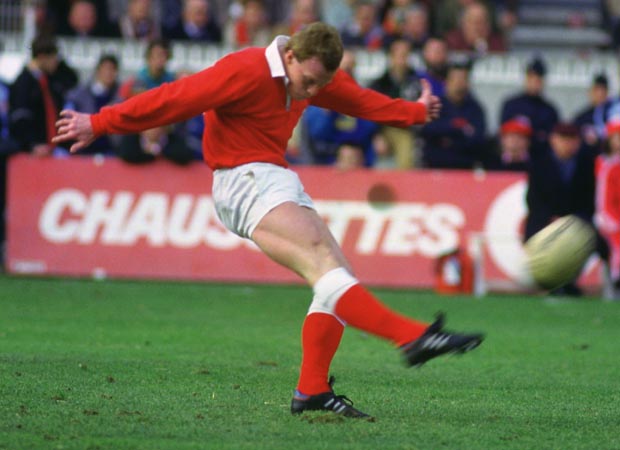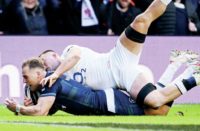 Some interesting ideas have come from Australia this week as they prepare to launch the new National Rugby Championship which they hope will save the ARU from the spectre of financial implosion.
Some interesting ideas have come from Australia this week as they prepare to launch the new National Rugby Championship which they hope will save the ARU from the spectre of financial implosion.
These ideas include a change in the scoring system, dropping penalties and drop-goals from three points to two while increasing the value for try conversions from two to three points.
As the complex nature of the game has come under more and more scrutiny and referees now take a more ‘hands on' approach for many areas of the game, there has been a dramatic increase in the number of penalties.
That alone should not be a problem, but improvements in pitch and ball technology have significantly increased the average kicking distance and enabled players to convert more penalties into points.
That is literally a game-changer as goal-kicking has become singularly the most important element of the game and the importance of a reliable goal kicker was and remains paramount if you want success.
So much so, that some teams have sacrificed players who are better ball players and runners for players who have better than average kicking ability.
From the day in 1986 when Paul Thorburn kicked a massive 62 metre penalty for Wales, (the longest penalty kicked in an international match so far) we have seen an increasing number of kicks from a team's own half over a distance of 50 metres or more.
This distance is only likely to increase as better pitch and ball technology – including the synthetics – are rolled out across the game. This will make the need for a change in scoring values a necessity if rugby is not to degenerate into just a kicking contest.
The argument that if players didn't offend, the referee would not award the penalty remains true – but should an innocuous incident like a collapsed scrum 50 odd metres from the try line decide the result of a game particularly when the referees decisions are so arbitrary ?
Then there is the argument that players will be encouraged deliberately to infringe, giving away penalties rather than tries and that may well be right but the modern game has the answer to this dilemma, called yellow cards.
If a referee feels that players are deliberately stopping try-scoring opportunities they can sin-bin players and, as much as I disagree with sin binning, the threat of it and the implications for the team reduced to 14 or fewer can be so devastating that it is questionable that coaches would be prepared to play players that are constantly leaving their team-mates in a hole.
The suggestion from Australia would make a try and conversion worth four times as much as a penalty and even with a degree of dubious refereeing, that should encourage teams to work that little bit harder to score a try rather than settle for a penalty.
Speaking of better than average goal kickers, I wonder if Jonny Wilkinson is happy that Leigh Halfpenny has stolen his thunder.
The leak by Halfpenny's associates that Wilkinson is to retire at the end of the season may well force Wilkinson to take a step that he perhaps is not prepared to take.
The word from Wilkinson himself was that he would make up his mind at the end of the season and not before and once his decision was made, he would speak directly to Toulon owner Mourad Boudjellal before making a public statement.
The one thing that he is missing from what is a ‘trophy cabinet' that any player could be proud of, is a Top 14 Champions medal. Having never won the title it may be that Wilkinson wants to finish on a high with the club that has enabled him to fulfil his ambitions as a club player.
His time at Newcastle was blighted by injury and a constant battle against relegation but his move to Toulon in the twilight of his career seems to have rekindled his passion for the game and, combined with the mass of talent brought to the club by Boudjellal, it would seem only a matter of time before Toulon win the Top14.
It may be that Halfpenny is right and Wilkinson has made up his mind already, after all, the claim hasn't been denied by Toulon, but it just might be that Wilkinson wanted the chance to still be involved even as a super sub. With Toulon currently sitting second in the Top 14 table, Wilkinson has one last chance of completing the dream.
It's good to see the Barbarians have returned to form in picking players that feel slightly bitter and twisted at being left out of their country's national teams.
Steffon Armitage, James O'Connor, Francois Trinh-Duc and Aurelien Rougerie have all stated a desire to continue their international careers but all efforts, no matter how good, seem to have fallen on the deaf ears of the national coaches.
When I was dropped from England at the end of 1992, the Barbarians selected me for the game against world champions Australia at Twickenham.
Despite the fact that we lost 30-20, I, along with my fellow front row, Ireland's Nick Popplewell and Wales' Nigel Meek had a good game. In fact I scored a try between the posts in front of the North stand (I still have the turf) and won an immediate recall to the England side. I am sure Armitage and the rest will be hoping for a similar result!




























Pingback: Belcampo Anya Fernald scandal